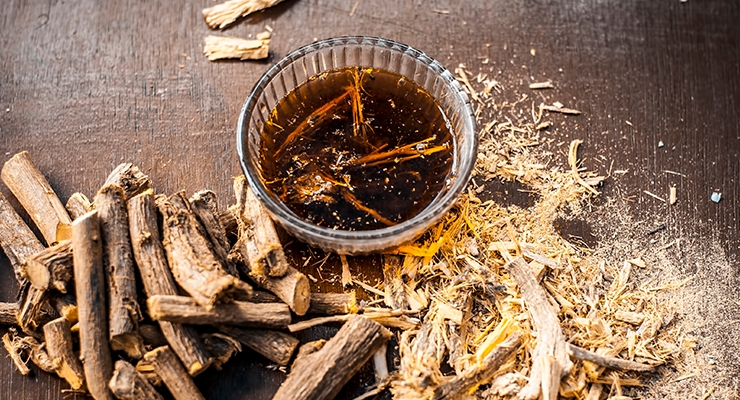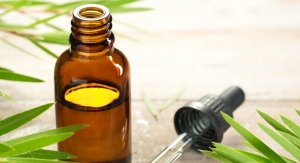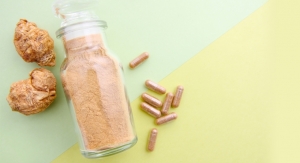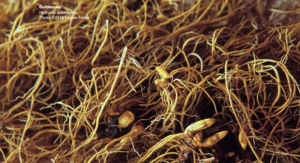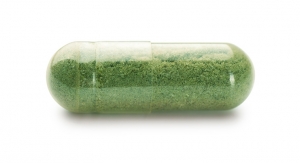01.18.19
Natural Remedies, an herbal products research and development company, has adopted licorice (Glycyrrhiza spp., Fabaceae) through the American Botanical Council (ABC) Adopt-an-Herb program. With its adoption of licorice, Natural Remedies helps ABC expand its nonprofit educational mission and keep its unique HerbMedPro database updated with the latest scientific and clinical research on this popular botanical.
HerbMedPro is a comprehensive, interactive online database that provides access to important scientific and clinical research data on the uses and health effects of 266 herbs.
Natural Remedies CEO and Managing Director Anurag Agarwal said: “We are proud of being associated with the American Botanical Council for adopting licorice. Our brand, Gutgard, is a clinically researched flavonoid-rich extract of licorice root and rhizome. This partnership stems from our core value of ‘being useful,’ as we want the world to recognize, through this adoption, the benefits of licorice in improving gut health. We are committed to unveiling the mystery of licorice with focused research which will ultimately strengthen the value offered by Gutgard to our customers.”
Mark Blumenthal, ABC founder and executive director, said: “On behalf of all of us here at ABC, we offer our profound thanks and gratitude to our good friends at Natural Remedies in Bengaluru for their adoption of licorice, a widely-used medicinal plant with a vast array of traditional and modern therapeutic uses. Natural Remedies’ adoption of licorice allows ABC to share up-to-date information on this ancient natural remedy with our members and the public.”
Licorice species are perennial herbs native to the Mediterranean region, Asia Minor to Iran, and central to southern Russia, and is widely cultivated throughout Europe, the Middle East, and Asia. The root is the primary plant part used in medicinal preparations. Medicinal use of licorice has been documented as far back as 2100 BCE, and licorice root preparations have been used in traditional medicinal systems, including Ayurveda, Siddha, Unani, and traditional Chinese medicine. In modern times, licorice root has been studied for its gastrointestinal benefits, particularly for ulcers; upper respiratory tract infections; and anti-inflammatory actions that may help treat allergic reactions, rheumatism, arthritis, and other conditions.
The root of G. glabra has a long history of traditional therapeutic use for treating digestive issues. Glycyrrhizin (also called glycyrrhizic acid), a triterpene saponin from licorice, is one of the herb’s well-known active constituents and the main sweet-tasting component.
Gutgard is a natural, clinically-researched bioactive preparation for gut health. It is different from deglycyrrhizinated licorice (DGL) with respect to chemistry and composition, the manufacturing process, mechanisms of action, and physicochemical properties. Most of the generic DGL-based extracts are byproducts of a chemical process used to separate glycyrrhizin from licorice.
Gutgard is standardized to contain 10% or more of total flavonoids (by weight) and 0.5% or less of glycyrrhizin to avoid potential undesirable side effects. More than 50 flavonoids have been identified in the extract by analytical techniques like liquid chromatography-mass spectrometry (LC-MS), including isoflavans (e.g., glabridin), flavones (e.g., licoflavone A), flavanones (e.g., glabrol), chalcones (e.g., isoliquiritigenin), and isoflavones (e.g., formononetin).
Licorice flavonoids have been shown to have beneficial activities related to the digestive system. Gutgard has been shown to be beneficial in digestive issues and also in reducing the gastric load of Helicobacter pylori.
Licorice’s adoption page in ABC’s HerbMedPro database can be found here; the HerbMedPro record on licorice is available here.
HerbMedPro is a comprehensive, interactive online database that provides access to important scientific and clinical research data on the uses and health effects of 266 herbs.
Natural Remedies CEO and Managing Director Anurag Agarwal said: “We are proud of being associated with the American Botanical Council for adopting licorice. Our brand, Gutgard, is a clinically researched flavonoid-rich extract of licorice root and rhizome. This partnership stems from our core value of ‘being useful,’ as we want the world to recognize, through this adoption, the benefits of licorice in improving gut health. We are committed to unveiling the mystery of licorice with focused research which will ultimately strengthen the value offered by Gutgard to our customers.”
Mark Blumenthal, ABC founder and executive director, said: “On behalf of all of us here at ABC, we offer our profound thanks and gratitude to our good friends at Natural Remedies in Bengaluru for their adoption of licorice, a widely-used medicinal plant with a vast array of traditional and modern therapeutic uses. Natural Remedies’ adoption of licorice allows ABC to share up-to-date information on this ancient natural remedy with our members and the public.”
Licorice species are perennial herbs native to the Mediterranean region, Asia Minor to Iran, and central to southern Russia, and is widely cultivated throughout Europe, the Middle East, and Asia. The root is the primary plant part used in medicinal preparations. Medicinal use of licorice has been documented as far back as 2100 BCE, and licorice root preparations have been used in traditional medicinal systems, including Ayurveda, Siddha, Unani, and traditional Chinese medicine. In modern times, licorice root has been studied for its gastrointestinal benefits, particularly for ulcers; upper respiratory tract infections; and anti-inflammatory actions that may help treat allergic reactions, rheumatism, arthritis, and other conditions.
The root of G. glabra has a long history of traditional therapeutic use for treating digestive issues. Glycyrrhizin (also called glycyrrhizic acid), a triterpene saponin from licorice, is one of the herb’s well-known active constituents and the main sweet-tasting component.
Gutgard is a natural, clinically-researched bioactive preparation for gut health. It is different from deglycyrrhizinated licorice (DGL) with respect to chemistry and composition, the manufacturing process, mechanisms of action, and physicochemical properties. Most of the generic DGL-based extracts are byproducts of a chemical process used to separate glycyrrhizin from licorice.
Gutgard is standardized to contain 10% or more of total flavonoids (by weight) and 0.5% or less of glycyrrhizin to avoid potential undesirable side effects. More than 50 flavonoids have been identified in the extract by analytical techniques like liquid chromatography-mass spectrometry (LC-MS), including isoflavans (e.g., glabridin), flavones (e.g., licoflavone A), flavanones (e.g., glabrol), chalcones (e.g., isoliquiritigenin), and isoflavones (e.g., formononetin).
Licorice flavonoids have been shown to have beneficial activities related to the digestive system. Gutgard has been shown to be beneficial in digestive issues and also in reducing the gastric load of Helicobacter pylori.
Licorice’s adoption page in ABC’s HerbMedPro database can be found here; the HerbMedPro record on licorice is available here.

